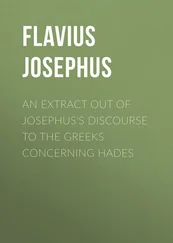Flavius Josephus - Antiquities of the Jews
Здесь есть возможность читать онлайн «Flavius Josephus - Antiquities of the Jews» — ознакомительный отрывок электронной книги совершенно бесплатно, а после прочтения отрывка купить полную версию. В некоторых случаях можно слушать аудио, скачать через торрент в формате fb2 и присутствует краткое содержание. Жанр: foreign_prose, История, foreign_edu, foreign_antique, на английском языке. Описание произведения, (предисловие) а так же отзывы посетителей доступны на портале библиотеки ЛибКат.
- Название:Antiquities of the Jews
- Автор:
- Жанр:
- Год:неизвестен
- ISBN:нет данных
- Рейтинг книги:5 / 5. Голосов: 1
-
Избранное:Добавить в избранное
- Отзывы:
-
Ваша оценка:
- 100
- 1
- 2
- 3
- 4
- 5
Antiquities of the Jews: краткое содержание, описание и аннотация
Предлагаем к чтению аннотацию, описание, краткое содержание или предисловие (зависит от того, что написал сам автор книги «Antiquities of the Jews»). Если вы не нашли необходимую информацию о книге — напишите в комментариях, мы постараемся отыскать её.
Antiquities of the Jews — читать онлайн ознакомительный отрывок
Ниже представлен текст книги, разбитый по страницам. Система сохранения места последней прочитанной страницы, позволяет с удобством читать онлайн бесплатно книгу «Antiquities of the Jews», без необходимости каждый раз заново искать на чём Вы остановились. Поставьте закладку, и сможете в любой момент перейти на страницу, на которой закончили чтение.
Интервал:
Закладка:
Flavius Josephus
Antiquities of the Jews
PREFACE. 1 1 ( return ) [ This preface of Josephus is excellent in its kind, and highly worthy the repeated perusal of the reader, before he set about the perusal of the work itself.] 2 ( return ) [ That is, all the Gentiles, both Greeks and Romans.] 3 ( return ) [ We may seasonably note here, that Josephus wrote his Seven Books of the Jewish War long before he wrote these his Antiquities. Those books of the War were published about A.D. 75, and these Antiquities, A. D. 93, about eighteen years later.] 4 ( return ) [ This Epaphroditus was certainly alive in the third year of Trajan, A.D. 100. See the note on the First Book Against Apion, sect. 1. Who he was we do not know; for as to Epaphroditus, the freedman of Nero, and afterwards Domitian's secretary, who was put to death by Domitian in the 14th or 15th year of his reign, he could not be alive in the third of Trajan.] 5 ( return ) [ Josephus here plainly alludes to the famous Greek proverb, If God be with us, every thing that is impossible becomes possible.] 6 ( return ) [ As to this intended work of Josephus concerning the reasons of many of the Jewish laws, and what philosophical or allegorical sense they would bear, the loss of which work is by some of the learned not much regretted, I am inclinable, in part, to Fabricius's opinion, ap. Havercamp, p. 63, 61, That "we need not doubt but that, among some vain and frigid conjectures derived from Jewish imaginations, Josephus would have taught us a greater number of excellent and useful things, which perhaps nobody, neither among the Jews, nor among the Christians, can now inform us of; so that I would give a great deal to find it still extant."]
1. Those who undertake to write histories, do not, I perceive, take that trouble on one and the same account, but for many reasons, and those such as are very different one from another. For some of them apply themselves to this part of learning to show their skill in composition, and that they may therein acquire a reputation for speaking finely: others of them there are, who write histories in order to gratify those that happen to be concerned in them, and on that account have spared no pains, but rather gone beyond their own abilities in the performance: but others there are, who, of necessity and by force, are driven to write history, because they are concerned in the facts, and so cannot excuse themselves from committing them to writing, for the advantage of posterity; nay, there are not a few who are induced to draw their historical facts out of darkness into light, and to produce them for the benefit of the public, on account of the great importance of the facts themselves with which they have been concerned. Now of these several reasons for writing history, I must profess the two last were my own reasons also; for since I was myself interested in that war which we Jews had with the Romans, and knew myself its particular actions, and what conclusion it had, I was forced to give the history of it, because I saw that others perverted the truth of those actions in their writings.
2. Now I have undertaken the present work, as thinking it will appear to all the Greeks 2 2 ( return ) [ That is, all the Gentiles, both Greeks and Romans.] 3 ( return ) [ We may seasonably note here, that Josephus wrote his Seven Books of the Jewish War long before he wrote these his Antiquities. Those books of the War were published about A.D. 75, and these Antiquities, A. D. 93, about eighteen years later.] 4 ( return ) [ This Epaphroditus was certainly alive in the third year of Trajan, A.D. 100. See the note on the First Book Against Apion, sect. 1. Who he was we do not know; for as to Epaphroditus, the freedman of Nero, and afterwards Domitian's secretary, who was put to death by Domitian in the 14th or 15th year of his reign, he could not be alive in the third of Trajan.] 5 ( return ) [ Josephus here plainly alludes to the famous Greek proverb, If God be with us, every thing that is impossible becomes possible.] 6 ( return ) [ As to this intended work of Josephus concerning the reasons of many of the Jewish laws, and what philosophical or allegorical sense they would bear, the loss of which work is by some of the learned not much regretted, I am inclinable, in part, to Fabricius's opinion, ap. Havercamp, p. 63, 61, That "we need not doubt but that, among some vain and frigid conjectures derived from Jewish imaginations, Josephus would have taught us a greater number of excellent and useful things, which perhaps nobody, neither among the Jews, nor among the Christians, can now inform us of; so that I would give a great deal to find it still extant."]
worthy of their study; for it will contain all our antiquities, and the constitution of our government, as interpreted out of the Hebrew Scriptures. And indeed I did formerly intend, when I wrote of the war, 3 3 ( return ) [ We may seasonably note here, that Josephus wrote his Seven Books of the Jewish War long before he wrote these his Antiquities. Those books of the War were published about A.D. 75, and these Antiquities, A. D. 93, about eighteen years later.] 4 ( return ) [ This Epaphroditus was certainly alive in the third year of Trajan, A.D. 100. See the note on the First Book Against Apion, sect. 1. Who he was we do not know; for as to Epaphroditus, the freedman of Nero, and afterwards Domitian's secretary, who was put to death by Domitian in the 14th or 15th year of his reign, he could not be alive in the third of Trajan.] 5 ( return ) [ Josephus here plainly alludes to the famous Greek proverb, If God be with us, every thing that is impossible becomes possible.] 6 ( return ) [ As to this intended work of Josephus concerning the reasons of many of the Jewish laws, and what philosophical or allegorical sense they would bear, the loss of which work is by some of the learned not much regretted, I am inclinable, in part, to Fabricius's opinion, ap. Havercamp, p. 63, 61, That "we need not doubt but that, among some vain and frigid conjectures derived from Jewish imaginations, Josephus would have taught us a greater number of excellent and useful things, which perhaps nobody, neither among the Jews, nor among the Christians, can now inform us of; so that I would give a great deal to find it still extant."]
to explain who the Jews originally were,—what fortunes they had been subject to,—and by what legislature they had been instructed in piety, and the exercise of other virtues,—what wars also they had made in remote ages, till they were unwillingly engaged in this last with the Romans: but because this work would take up a great compass, I separated it into a set treatise by itself, with a beginning of its own, and its own conclusion; but in process of time, as usually happens to such as undertake great things, I grew weary and went on slowly, it being a large subject, and a difficult thing to translate our history into a foreign, and to us unaccustomed language. However, some persons there were who desired to know our history, and so exhorted me to go on with it; and, above all the rest, Epaphroditus, 4 4 ( return ) [ This Epaphroditus was certainly alive in the third year of Trajan, A.D. 100. See the note on the First Book Against Apion, sect. 1. Who he was we do not know; for as to Epaphroditus, the freedman of Nero, and afterwards Domitian's secretary, who was put to death by Domitian in the 14th or 15th year of his reign, he could not be alive in the third of Trajan.] 5 ( return ) [ Josephus here plainly alludes to the famous Greek proverb, If God be with us, every thing that is impossible becomes possible.] 6 ( return ) [ As to this intended work of Josephus concerning the reasons of many of the Jewish laws, and what philosophical or allegorical sense they would bear, the loss of which work is by some of the learned not much regretted, I am inclinable, in part, to Fabricius's opinion, ap. Havercamp, p. 63, 61, That "we need not doubt but that, among some vain and frigid conjectures derived from Jewish imaginations, Josephus would have taught us a greater number of excellent and useful things, which perhaps nobody, neither among the Jews, nor among the Christians, can now inform us of; so that I would give a great deal to find it still extant."]
Интервал:
Закладка:
Похожие книги на «Antiquities of the Jews»
Представляем Вашему вниманию похожие книги на «Antiquities of the Jews» списком для выбора. Мы отобрали схожую по названию и смыслу литературу в надежде предоставить читателям больше вариантов отыскать новые, интересные, ещё непрочитанные произведения.
Обсуждение, отзывы о книге «Antiquities of the Jews» и просто собственные мнения читателей. Оставьте ваши комментарии, напишите, что Вы думаете о произведении, его смысле или главных героях. Укажите что конкретно понравилось, а что нет, и почему Вы так считаете.












